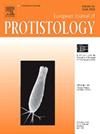Testate amoebae response and vegetation composition after plantation removal on a former raised bog
Abstract
Extensive drainage of peatlands in north-west Europe for the purposes of afforestation for timber production and harvesting has altered the carbon balance and biodiversity value. Large-scale restoration projects aim to reinstate hydrological conditions to keep carbon locked up in the peat and to restart active peat growth. Testate amoebae are an informal grouping of well-studied protists in peatland environments and as microbial consumers play an important role in nutrient and carbon cycling. Using a space for time substitution approach, this study investigated the response of testate amoebae assemblages and vegetation composition after tree removal on a drained raised bog. There was a clear difference in microbial assemblages between open and a chronosequence of restoration areas. Results suggest microbial recovery after rewetting is a slow process with plant composition showing a faster response than the microbial assemblage. Mixotrophic testate amoebae had not recovered seventeen years following plantation removal and the establishment of Sphagnum mosses in the wetter microforms. These results suggest that vegetation composition and Testate amoeba assemblages respond differently to environmental drivers at forest-to-bog restoration areas. Local physicochemical peat properties were a stronger driver of the testate assemblage compared with vegetation. Complete recovery of microbial assemblages may take place over decadal timescales.

 求助内容:
求助内容: 应助结果提醒方式:
应助结果提醒方式:


